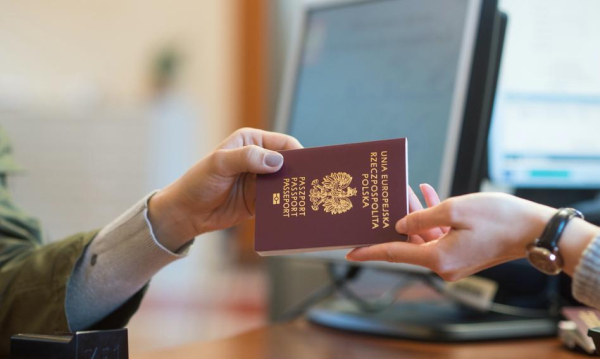Year after year, more and more foreigners want to obtain Polish citizenship. Last year, over 16,300 people received it, compared to only 6,600 in 2019. We examine what it takes to become Polish.

According to data from the Ministry of Interior and Administration, a total of 16,342 people of various nationalities obtained Polish citizenship in 2024. The largest number of them were Ukrainian citizens – 8,219 . This is a record number, considering that the previous year nearly 10,000 people officially became Poles, and in 2019, there were only about 6,000.
“Polish citizenship is a rarity these days. It provides a gateway to many countries around the world. That's why the number of applications for Polish citizenship, as well as the number of grants themselves, is growing. The number of recognitions of Polish citizenship is particularly high. Last year, we had 2,286 in our voivodeship, and this year, in just six months, as many as 1,338,” Lucyna Gajda, Director General of the Małopolska Voivodeship Office in Kraków, tells Bankier.pl . ” The most common applicants for recognition as Polish citizens are Ukrainians, Belarusians, Russians of Polish descent, Armenians, but also Turks and Britons . These include even European Union citizens, such as the French, Italians, and Hungarians.”
How to obtain Polish citizenship?
Polish law provides several main paths to obtaining citizenship. The most common are:
- granting citizenship by the President of the Republic of Poland
- recognition as a Polish citizen by the voivode
- repatriation
- restoration of citizenship – for persons who lost it before 1 January 1999
You must prove your connection with Poland.
In the case of an application to the President of the Republic of Poland, it should be submitted through the voivode responsible for the place of residence or, if the applicant is outside of Poland, through a Polish consul. According to Lucyna Gajda, in addition to completing a special form, it's also worth presenting your background and compelling reasons for wanting to become Polish .

“ Foreigners most often try to demonstrate that they have a job or residence here, cultivate Polish traditions, run a business here, or have children living here. Letters of support from respected individuals can also be attached,” says Lucyna Gajda. “When such an application reaches the voivode, he or she checks the person's history in Poland and forwards his or her opinion to the Minister of Interior and Administration. There, the application is reviewed by, among others, the Internal Security Agency, the National Police Information System, and the Border Guard to ensure that the individual does not pose a threat to Poland's security. The documentation, along with the minister's opinion, is then forwarded to the President of the Republic of Poland, who makes the final decision.”
This decision cannot be appealed, but a new citizenship application can be submitted. The deadlines specified in the Code of Administrative Procedure do not apply to the President. Therefore, the application may take up to two or three years to process.
As of July 1, 2025, the granting of citizenship by the President of the Republic of Poland costs PLN 1,669. Previously, it was free. This fee must be paid when submitting the application to the voivode. It is non-refundable, even in the event of a negative decision.
Stable income, housing and language skills required
The most common method of acquiring Polish citizenship is recognition as a Polish citizen by a voivode . However, for this to be possible, a person must meet certain conditions :
- stay in Poland for a period of one to three years on the basis of permanent residence permits (permanent residence, long-term EU resident's residence, permanent residence permit),
- have a stable, regular source of income,
- have legal title to the occupied residential premises,
- know Polish (B1 certificate or have completed a school where Polish is the language of instruction).
“The voivode must check the person's identity with the Internal Security Agency (ABW), the Police, the Border Guard, and other agencies if he deems it necessary. Unfortunately, there are also cases of forged documents or information that a person has a criminal record. While this doesn't disqualify them, it must be thoroughly investigated, especially in today's climate,” explains Lucyna Gajda. ” The entire procedure takes about six months , although it can be shorter or longer if additional explanations are required. If the voivode issues a negative decision, an appeal can be made to the Minister of Internal Affairs and Administration.”
Until recently, the stamp duty for the entire procedure for recognizing a person as a Polish citizen by the voivode was PLN 219, and from July 1, 2025, it is PLN 1,000.
Origin matters
Another way to acquire citizenship is repatriation. This applies especially to people living in the former Soviet Union, where there are still many descendants of exiles, i.e., people of Polish descent.
“If a person who currently holds citizenship in Russia, Kazakhstan, or Uzbekistan proves to the consul that they are of Polish nationality and receives the appropriate document and a repatriation visa, they can travel to Poland on that basis. Then, by operation of law, they become a Polish citizen the moment they cross the border,” explains Lucyna Gajda.
Restoration of Polish citizenship, on the other hand, is a procedure for individuals who previously held Polish citizenship but lost it, for example, as a result of emigration, a change of citizenship, or a decision by the communist authorities. In such a situation, the application should be submitted to the Minister of Interior and Administration, or if residing outside of Poland, to the nearest Polish embassy or consulate. Depending on the individual situation and the completeness of the documentation, the entire procedure takes from 2 to 6 months .
There is no need to renounce your original citizenship
Polish citizenship is not just a document and voting rights. It also provides access to all social rights, diplomatic protection, and free access to the labor market throughout the European Union. For many foreigners, it is also a symbol of integration and recognition of their long-standing contribution to the country's social and economic life. Therefore, although the procedure for obtaining it can be time-consuming and demanding, a growing number of people are willing to undergo it.
“It's certainly also important that a foreigner acquiring Polish citizenship doesn't have to renounce their primary citizenship. Since 2009, there has been no such requirement, ” adds Lucyna Gajda.






